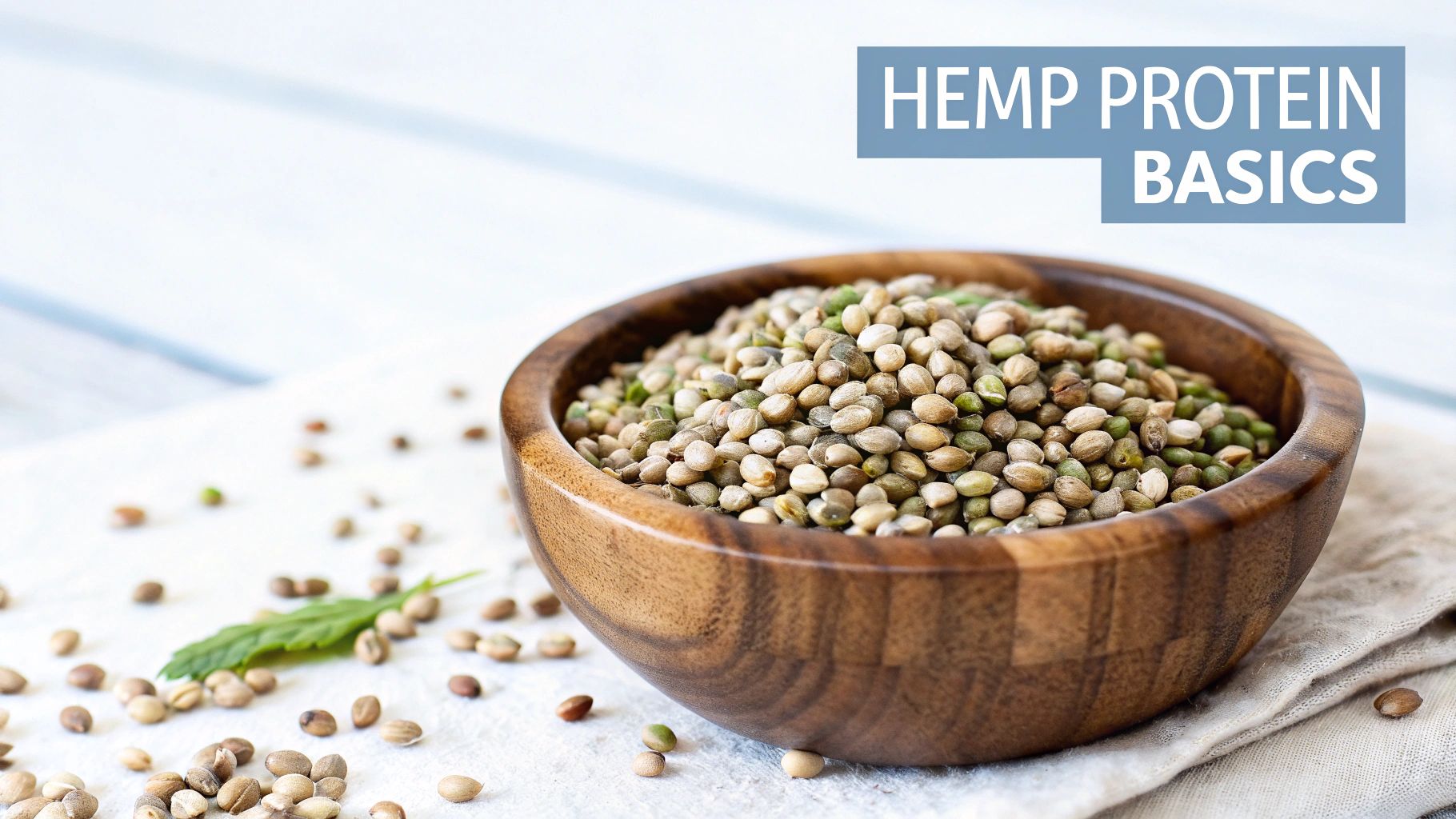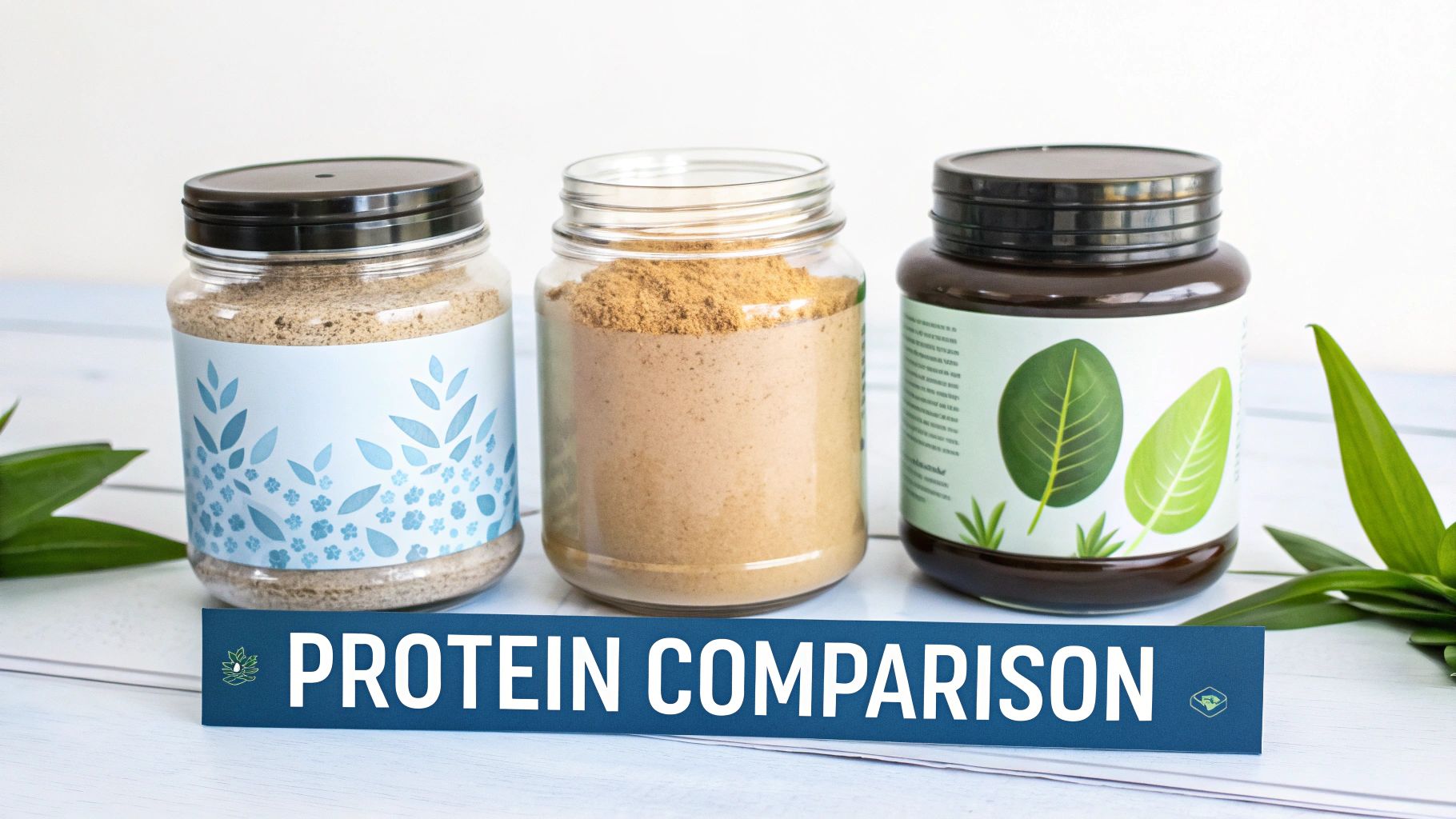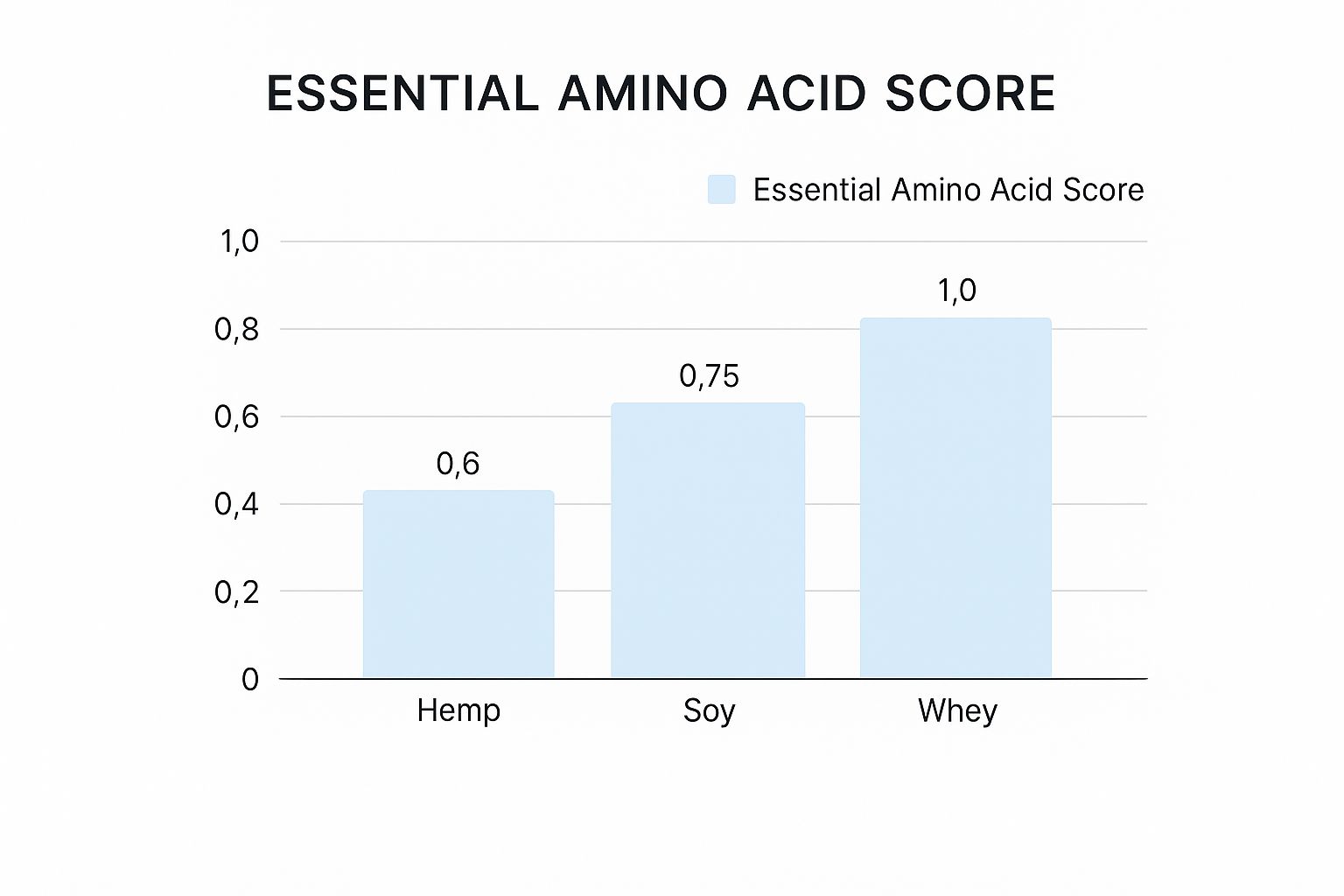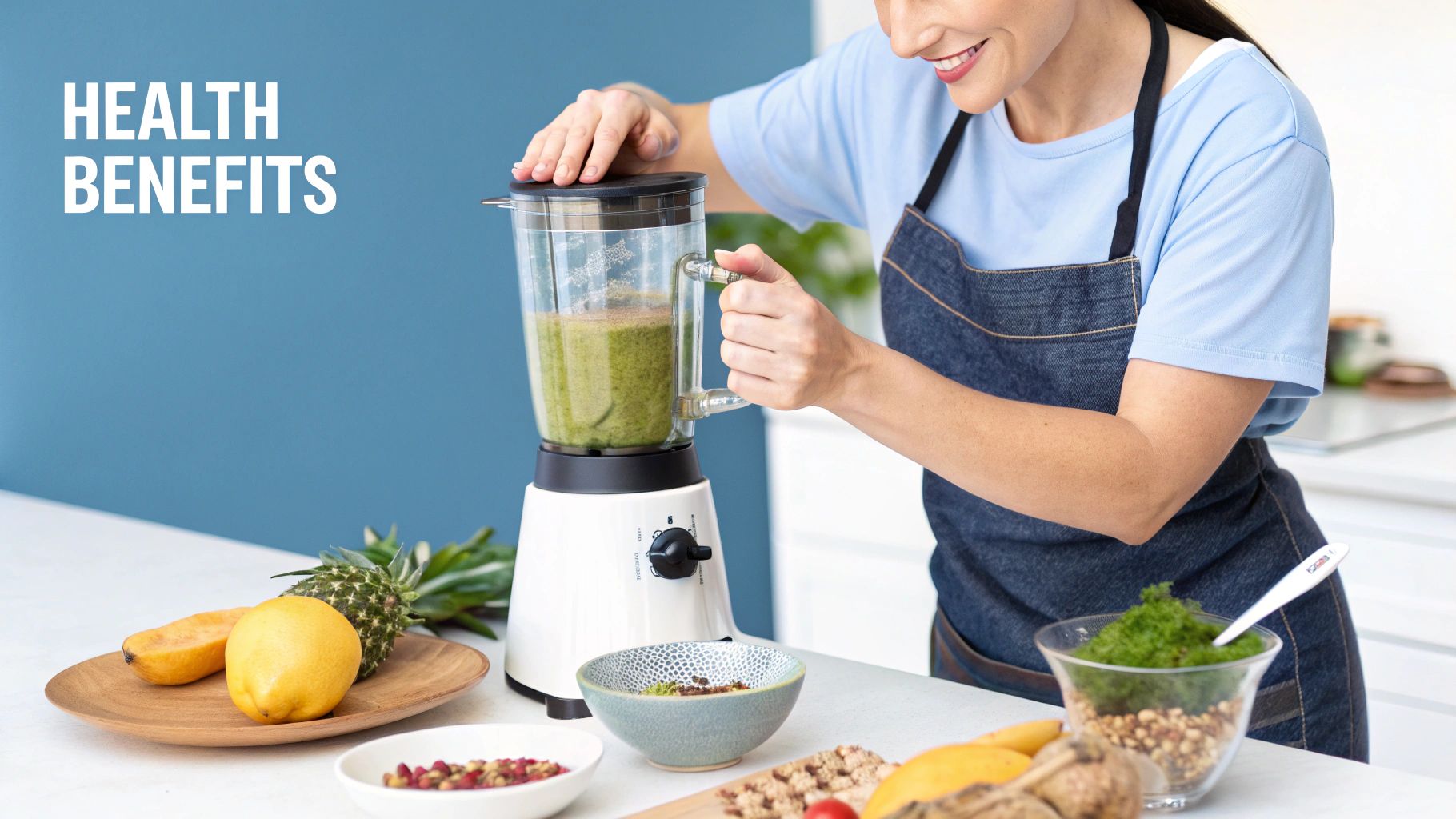So, is hemp protein a complete protein? Let's get right to it. Yes, it absolutely is. It has all nine of the essential amino acids your body needs but can’t make for itself. But, like with most things in nutrition, there's a little more to the story. While it has all nine, one of them is present in a smaller amount, making its profile great, but not quite perfect.
The Straight Answer on Hemp Protein's Completeness

When we talk about a "complete protein," think of it like a full toolkit. To build or repair anything effectively—in this case, your muscles, hormones, and immune system—you need every single tool. If you're missing even one wrench, the whole project can grind to a halt. Those tools are the nine essential amino acids, and you have to get them from the food you eat.
Hemp protein brings every single one of those essential tools to the table. That’s a massive win for a plant-based protein, as many other plants are like a toolkit that's missing a screwdriver or a hammer.
Where Hemp Shines and Where It Falls Short
Hemp has a well-rounded profile that checks every box: histidine, isoleucine, leucine, lysine, methionine, phenylalanine, threonine, tryptophan, and valine are all there. It's especially loaded with arginine (5.85 g per 100 g) and methionine (1.01 g per 100 g), which are fantastic for supporting your heart and metabolic health. You can learn more about the valuable nutrients in hemp protein and see just how powerful it is.
So what's the catch? It all comes down to one amino acid: lysine. While lysine is present, its levels are lower compared to the others.
To make this crystal clear, here’s a quick rundown of how hemp stacks up for each essential amino acid.
Hemp Protein's Essential Amino Acid Scorecard
This table gives you a snapshot of where hemp protein delivers and identifies its one limiting factor.
| Essential Amino Acid | Hemp Protein Level | Status |
|---|---|---|
| Histidine | Adequate | ✅ Sufficient |
| Isoleucine | Adequate | ✅ Sufficient |
| Leucine | Adequate | ✅ Sufficient |
| Lysine | Low | ⚠️ Limiting Amino Acid |
| Methionine | High | ✅ Strength |
| Phenylalanine | Adequate | ✅ Sufficient |
| Threonine | Adequate | ✅ Sufficient |
| Tryptophan | Adequate | ✅ Sufficient |
| Valine | Adequate | ✅ Sufficient |
As you can see, lysine is what we call the "limiting amino acid."
This doesn't mean hemp is an incomplete protein. It simply means lysine is the amino acid you’ll "run out of" first if hemp is your only protein source. This could potentially slow down your body's ability to build new protein.
For the vast majority of us eating a varied diet with other protein sources (like beans, lentils, or quinoa), this is a non-issue. Your other foods will easily fill that small gap. But if you’re leaning heavily on hemp for your protein needs, just being aware of this little detail helps you build a smarter, more complete nutritional strategy.
Understanding What Makes a Protein 'Complete'
You hear the term “complete protein” thrown around a lot in health and fitness circles, but what does it actually mean? Let's skip the confusing jargon and get right to it.
Think of a protein as a long, intricate chain. The individual links in that chain are called amino acids. Your body is pretty resourceful and can actually manufacture most of these amino acid links on its own. These are called non-essential amino acids.
But there are nine specific amino acids that your body simply can't make. These are the essential amino acids, and you have to get them from the food you eat.
The Building Blocks Your Body Can't Make
It’s a bit like building something with a LEGO set. The instructions require certain specialty pieces to hold the whole thing together. If you're missing even one of those unique pieces, you can't finish the model correctly.
The nine essential amino acids are those non-negotiable specialty pieces for your body. Without them, your body's ability to build and repair tissue grinds to a halt.
These nine crucial building blocks are:
- Histidine
- Isoleucine
- Leucine
- Lysine
- Methionine
- Phenylalanine
- Threonine
- Tryptophan
- Valine
When a food source contains all nine of these essential amino acids in decent amounts, we call it a complete protein. It gives your body the full toolkit it needs to build everything from muscle and hormones to enzymes.
Complete vs. Incomplete Proteins
This is where the real difference between protein sources comes into play.
A complete protein is like having a full deck of cards—you can play any game. An incomplete protein is like having a deck with a few cards missing. You can still play, but your options are limited.
Animal sources like meat, eggs, and whey protein are the classic examples of complete proteins. They have the full set. Many plant-based proteins, however, are considered "incomplete" because they're low in one or more of these essential amino acids.
This is exactly why the question, "is hemp protein a complete protein?" is so important for anyone looking to optimize their nutrition, especially on a plant-based diet. Understanding this difference is key to making sure you're giving your body the high-quality fuel it needs to thrive.
Analyzing Hemp Protein's Amino Acid Profile

We know that hemp protein technically contains all nine essential amino acids, but it's time to dig a little deeper. Not all "complete" proteins are built the same. The real magic lies in the specific amounts of each amino acid, which determines how well your body can put it to work for things like muscle repair and immune support.
Think of it like baking a cake. You can have all the right ingredients on the counter, but if the proportions are off, the result won't be what you hoped for.
Hemp protein really shines where other plant proteins often come up short. It's a fantastic source of arginine, an amino acid that helps with blood flow and supports heart health. It also provides a solid dose of methionine and cysteine, which are vital for creating antioxidants and building strong hair, skin, and nails. You can dive into the complete amino acid profile of hemp protein to see exactly how it stacks up against other plant-based options.
Understanding Digestibility And Bioavailability
So, we know what's inside the powder, but how much of it can your body actually absorb and use? This is where a metric called the Protein Digestibility-Corrected Amino Acid Score (PDCAAS) comes into play. This score looks at a protein's quality based on both its amino acid content and how easily we can digest it.
A PDCAAS score of 1.0 is the gold standard, a rating held by animal-based proteins like whey and casein, as well as soy. Hemp protein comes in with a very respectable score of around 84-86%.
This high score means it's incredibly digestible and bioavailable, especially for a plant source. Its main proteins, edestin (60-80%) and albumin, are easy for the body to break down. While its lower lysine content keeps it from hitting a perfect 1.0, its excellent digestibility ensures you're getting a ton of nutritional value in every scoop.
Ultimately, hemp’s amino acid profile is one of its biggest assets. It delivers all nine essentials, excels in key areas like arginine, and is impressively easy to digest. This powerful combination makes it a truly effective choice, not just a "technically complete" one.
How Hemp Measures Up Against Other Proteins
So, we know hemp protein is a complete protein, which is a fantastic starting point. But how does it really stack up when you put it head-to-head with the other big names on the protein aisle? Knowing the key differences is crucial for picking the right fuel for your body and your goals.
Let's see how hemp holds its own against the competition.

As you can see, whey protein might be considered the gold standard for its amino acid score, but hemp is right there with it, proving itself as a seriously high-quality plant-based option.
Protein Powder Showdown: Hemp vs. The Competition
Choosing a protein powder isn't just about the grams of protein. It's about how it fits your lifestyle, your dietary needs, and how your body actually uses it. This quick comparison breaks down the most popular options.
| Protein Source | Complete Profile? | Key Allergen? | Digestibility | Notable Feature |
|---|---|---|---|---|
| Hemp | Yes | No | Excellent | High in fiber & omega-3s |
| Whey | Yes | Yes (Dairy) | Fast | Rapid muscle absorption |
| Soy | Yes | Yes (Soy) | Moderate | Often genetically modified |
| Pea | No (low methionine) | No | Good | Can cause bloating in some |
This table gives a bird's-eye view, but the real story is in the details. Hemp shines not just for what it has, but for what it doesn't have—namely, common allergens and digestive troublemakers.
Hemp vs. Whey Protein
Whey protein, which comes from dairy, has long been the king in the fitness world. It's famous for its rapid absorption and perfect amino acid profile, making it a go-to for muscle building. The major downside? It’s a huge allergen. For anyone with a milk allergy or lactose intolerance, whey can mean serious digestive upset.
This is where hemp protein comes in as a hypoallergenic powerhouse. It offers a much slower, more sustained release of protein and is loaded with fiber and omega fatty acids—two things you won't find in whey.
If you’re looking for something gentle on your stomach that offers more than just protein, hemp is the clear winner. It actively supports your gut health and delivers healthy fats, making it a far more complete nutritional choice.
Hemp vs. Soy and Pea Protein
Looking at other plant-based options, soy is technically a complete protein, but it’s also one of the most common allergens and frequently comes from genetically modified crops. Pea protein has shot up in popularity with a great amino acid profile, though it sometimes gives sensitive individuals issues with bloating. If you want a deeper dive, check out this detailed hemp protein vs. pea protein comparison.
It's also helpful to compare hemp to other staple plant-based protein sources like organic grains and beans to understand its unique place in a balanced diet.
Hemp really stands apart from the crowd. It’s allergen-free, packed with fiber, and minimally processed. That special blend of protein, healthy fats, and fiber makes it an incredible, well-rounded option for anyone who puts clean, sustainable, and gut-friendly nutrition first.
How To Maximize Hemp Protein's Potential

So, we know hemp protein is an incredible choice, but it does have one tiny imperfection: it's a little lower in the amino acid lysine. Thankfully, you don't need a nutrition degree to fix this. The solution is a simple, effective strategy called protein combining.
Think of it this way. Your body needs a full set of tools to build and repair itself. Hemp protein gives you almost the entire toolkit in spades, but you're just a bit short on one specific wrench—lysine. Protein combining is as easy as grabbing that missing wrench from another plant-based toolbox to complete your set.
The whole goal is just to pair hemp with other foods that are naturally rich in lysine. This simple habit creates a powerhouse meal with a perfectly balanced amino acid profile, giving your body everything it needs to thrive.
Easy Ways To Combine Your Proteins
Chances are, you're already doing this without even thinking about it. Here are a few practical and delicious ways to boost your lysine intake and maximize all the health benefits of hemp protein:
- Mix with Legumes: Stir a scoop of hemp protein into a warm lentil soup or a hearty black bean chili.
- Pair with Quinoa: Sprinkle some hemp seeds or hearts over a quinoa salad. This adds a great texture boost and completes the protein profile.
- Blend with Pea Protein: In your daily smoothie, try combining a scoop of hemp protein with a scoop of pea protein.
Even though hemp’s lysine content is better than many other plant sources, it doesn't quite hit the daily requirements set by global health organizations all by itself. Research actually shows that fortifying hemp products with a bit of extra lysine can help people meet their daily amino acid needs perfectly.
By making these small, intentional pairings, you effortlessly solve the lysine puzzle. This simple step ensures your body can take full advantage of hemp's incredible nutritional power.
The Final Verdict on Your Protein Choice
So, after digging into all the details, what's the final word? Is hemp protein a complete protein? The answer is a resounding yes. It absolutely ticks all the boxes, containing all nine essential amino acids required to earn that "complete" label.
But calling it just a protein source really sells it short. Hemp is a genuine nutritional powerhouse. On top of its amino acid profile, it's loaded with gut-friendly fiber, heart-healthy omega fatty acids, and crucial minerals like magnesium and iron. This makes it an incredibly well-rounded choice, especially if you're looking for a clean, whole-food option.
The only tiny asterisk is its slightly lower level of lysine. But as we've talked about, that's a simple fix. Getting into the habit of protein combining—pairing your hemp with lysine-rich foods like beans, quinoa, or even a scoop of pea protein—easily solves this.
The bottom line is that hemp protein is a high-quality, technically complete protein that brings much more to the table than just muscle support. It helps your digestive system, delivers healthy fats, and is one of the most allergen-friendly options you can find.
When you choose hemp, you're not just picking a protein powder. You're picking a clean, effective, and versatile partner for your overall health journey. It confidently steps up as a complete plant-based protein that truly nourishes your body.
Your Top Questions About Hemp Protein Answered
Even after getting the facts straight, a few common questions always seem to come up. Let's tackle some of the most frequent ones I hear about using hemp protein.
Can You Really Build Muscle With Just Hemp Protein?
Absolutely. You can definitely build muscle with hemp protein because it gives you all nine essential amino acids—the building blocks for muscle repair and growth.
The only thing to keep in mind for optimal muscle growth is its slightly lower lysine content. To get the best results, just make sure you're also eating lysine-rich foods like lentils or quinoa. It’s an easy fix.
Does Hemp Protein Have Any THC or CBD in It?
This is a big one, and the answer is a clear no. Hemp protein comes from hemp seeds, which have virtually zero THC or CBD.
It's completely non-psychoactive, which makes it a safe and reliable choice for athletes or anyone who undergoes regular drug testing.
You get all the powerful nutritional benefits of the hemp plant without any of the cannabinoids. It’s pure, plant-based fuel.
Is Hemp Protein a Good Choice for Weight Loss?
Hemp protein can be an excellent partner on your weight loss journey. Its powerful combo of high fiber and complete protein helps you feel fuller for longer.
This can seriously help curb those afternoon snack cravings and reduce your overall calorie intake, all while supporting a healthy metabolism. It's a smart addition to any weight management plan.

